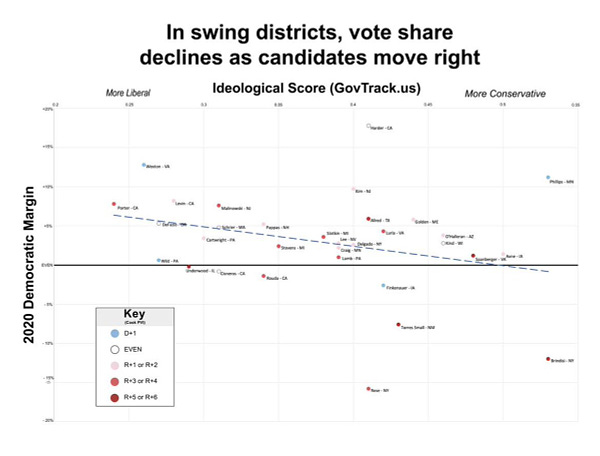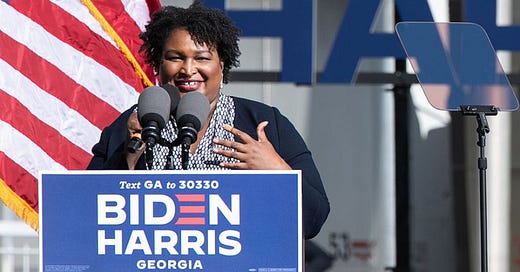Welcome to the big Sunday edition of Progressives Everywhere!
We’ve got a packed newsletter today, but first, let’s all take a deep sigh of relief. Or scream. Either one, I’ll leave it up to you.
OK, now before we get to the news and analysis (lots on early Biden administration policy and personnel, election fall-out, and demographics), let’s look at where we are and the challenges on the immediate horizon.
This is by far the happiest-ever edition of Progressives Everywhere, which was born in late 2017 under the dark cloud of full Republican control of the government. Toppling Donald Trump feels both like the manifestation of the inevitable and the vanquishing of a (sloppy) immortal.
To celebrate, I went down to Trump Tower with my wife and a few friends (while wearing masks). We joined in on an impromptu celebration around the barricades that keep most people away from the garish gold building on Fifth Ave. Then I ate a Milky Way. It was a party.
Still, while we’re deservedly rapturous in the streets this weekend, we shouldn’t be close to satisfied with the state of things on the whole. A lot went wrong in this election (especially down-ballot) and really, the work has just begun.
To start, if we want any chance of enacting any big progressive reforms over the next two years, we have to win the Senate. Democrats screwed up very winnable races in Maine and North Carolina, but now we’ve got a chance to make good with two special elections in Georgia — a state that just turned blue.
It’s impossible to overemphasize just how much hinges on the special elections. From a major stimulus bill to the public option on healthcare to a massive climate change plan, not to mention expanding the Supreme Court, it’ll all be on the line in Georgia.
Thankfully, Democrats don’t just have two solid candidates, they benefit from the amazing grassroots organizing done by activist groups in the state. They’re the reason Democrats won Georgia’s electoral votes — Stacey Abrams is the face of the movement, but there are many other invaluable figures.
There are two ways to help. You can volunteer for those groups (learn more here) and you can donate to both the campaigns and the grassroots organizers:
Thank you to GoFundMe donors: Margaret, Diane, Galen, Joe, Katie, Michael, and Judy
So, What’s Next?
Defeating Donald Trump wasn’t just about wresting power away from him and going back to the old, pre-2016 normal. Democrats now need to use their power to enact the massive progressive change that this country desperately needs. Many of the big-ticket items will require control of the Senate, but there is also no shortage of significant priorities that can be achieved with executive power.
It took years for President Obama to realize that Republicans weren’t going to work with him and that he’d need to turn to executive orders. While he’s preaching bipartisanship, Biden clearly learned from that experience, as he’s already announced a flurry of Day One orders that will undo some of Trump’s most pig-headed and racist decisions. They include:
Rejoin the Paris Climate Accord
Stop the ordered withdrawal from the WHO
Repeal the Muslim travel ban
Reinstate the “Dreamers” program
Reinstating 100 environmental and public health rules that Trump repealed
This summer, the Biden and Bernie Sanders campaign came together to create a unity commission that produced a substantial list of policies and priorities that a Biden administration should pursue. The legislative possibilities are in limbo and Biden isn’t obligated to actually try to make any of them happen, but if he’s inclined to make good on at least some of the easier ones, The American Prospect found 277 different executive decisions and unilateral changes his administration could make.
They run the gamut from the climate and criminal justice to healthcare, immigration, and the economy, and some represent bigger changes than others. Some of the most notable, for my money, include:
Enforce rules against pharmaceutical companies’ manipulation of generic markets, crack down on drug monopolies, and use Medicare to target excessively priced drugs that have no competition.
Restore protections for LGBTQ+ people against health insurance discrimination
Restore net neutrality
Expand broadband for low-income communities
Aggressively pursue and prosecute discrimination in lending violations
Ban federal contracts for union-busting employers
Pause monthly billing and stop interest from accruing on federal student loans for debtors earning less than $25,000. (He could forgive all student debt, but sadly, that isn’t happening).
Reschedule marijuana to a lower level of the Controlled Substances Act schedule entirely or remove it entirely. That would make it no longer a felony to possess the drug nationwide. They could reduce criminal penalties for other drug possession in federal courts, too.
Limit police militarization
Withhold funds from states which use cash bail
It’ll take pressure to make even some of these things happen, and a lot of them won’t be done in the first 100 days.
Who will be in Biden’s cabinet?
With the Senate likely to remain in Republican hands (donate!), Biden has two options:
Try to get his nominees confirmed, which would likely require more moderate selections.
Say screw it and do what Trump did, going largely with unconfirmed acting secretaries.
Biden is an institutionalist, so I'm going to guess that he’ll attempt to make the first option work first. Politico has a rundown of some of the possibilities in both cases, though most of the names probably won’t excite progressives all that much.
Some of those cabinet positions are far more prominent and important than others, so we’re likely to see progressives get some consolation prizes in the less consequential offices. Still, there are some red lines that will create a lot of anger if crossed (which may actually be the point, moving the goalposts). One of those is Rhode Island Gov. Gina Raimondo, who reformed the state’s public pension system and pleased absolutely nobody in doing so.
Sen. Elizabeth Warren is also interested in the job, and she’d obviously be progressives’ dream nominee. The fact that Massachusetts has a Republican governor shouldn’t be an issue — Democrats have a supermajority in the state legislature, so they can change the law that right now allows Gov. Charlie Baker to appoint a replacement senator until a special election.
Other names for Treasury include progressive favorite Sarah Bloom Raskin, who was Deputy Secretary of the U.S. Treasury from 2014-17 and has been very critical of the unequal government response to the Great Recession.
On Demographics and Internal Sniping
This year’s record voter turnout and extreme polarization made for some very unusual results. Democrats took back the White House by not just winning back most of the Rust Belt, but also flipping the electoral votes of long-time GOP strongholds Arizona and Texas. And yet, the party also whiffed big time on what should have been relatively easy Senate pickups, lost a whole bunch of seats in the House, and got absolutely demolished in legislative elections.
After uniting to defeat Trump, moderate and progressive factions of the party have been engaged in a war of words since the polls closed on Tuesday.
Moderates like Rep. Abigail Spanberger have been raging at the left for getting behind and popularizing policies like Medicare for All and defunding the police, which she claims doomed Democrats in more centrist districts. On the other hand, Rep. Alexandria Ocasio-Cortez fired back by flat-out saying that many Democrats ran outdated campaigns with zero focus on digital or community organizing and refused to accept any help.
So which side is right?
(Well, first, a preface: Gerrymandering hurt Democrats, just as Republicans intended. Democrats flipped a lot of seats in 2018 on gerrymandered maps by very slim margins, and with higher GOP turnout, a lot of them flipped back. The seats that Democrats targeted in red legislatures in states like Texas, Georgia, Michigan, Pennsylvania, and North Carolina, were also gerrymandered, so it was never a fair playing field.
With the GOP domination of this election, gerrymandering will likely only get worse in Texas and Georgia. Control of the Supreme Court in Pennsylvania and North Carolina could prevent gerrymanders from being quite as awful, while independent redistricting commissions in Michigan and Arizona should make things a bit fairer. OK, now back to the debate!)
AOC was one of the first candidates we endorsed here at Progressives Everywhere way back in the spring of 2018, so it shouldn’t be surprising that I lean toward her argument. However, I don’t agree with her because I think all Democrats need to go all-in on the most lefty policies possible — a big part of our project has been to get Democrats elected in swing districts and progressive elected in safer Democratic districts. To me, it’s tactics that we need to figure out, not ideology.
I’ve said this many times, but Democrats need to give people a reason to vote for them, not just against the other guy. Moderates can absolutely do this! But this year, they largely failed to do so — it was all about warning people about losing protection for pre-existing conditions on their crappy healthcare and shaming their opponents for having potty mouths. Candidates on the left tend to actually emphasize their beliefs, their policy proposals, and how exactly they’ll help people. Look at Katie Porter — she flipped a historically red district in 2018 and quickly became such a well-known advocate and fighter that she only had a token GOP challenger this year.


The fact that Arizona and Georgia went blue has little to do with any Democratic candidate; instead, a decade of grassroots organizing has shifted those once-solid red states. Democrats also piled on votes in the urban districts represented by community organizers like Michigan Rep. Rashida Tlaib, who helped create the margin necessary to flip the state.
In a lot of ways, Democrats this year did what they didn’t do in 2016, but forgot to also do what worked for them in the past. They were able to appeal more to white suburban voters who were disgusted with Trump, but took people of color for granted. Ironically, the complaints about the “defund the police” slogan hurting centrists don’t comport with the fact that the suburbs went further blue.
In the states where they didn’t have a strong organizing presence, minorities came out for Republicans in startingly large numbers (relatively speaking). Look at what happened in Harris County, TX, where Democrats were hoping to make gigantic gains and flip legislative seats:


Again, I’m not saying that the Democrats in these districts (where they generally lost) should have come out in favor of the most progressive policies. But I think they needed to be obviously in favor of something that suggested to voters that they were willing to fight for them. Not everyone’s district is going to be into Medicare for All, but a Democrat who has an actual policy preference that they frequently tout makes it far harder to tag them as a socialist.
(And remember, an overwhelming majority of Floridians voted for a $15-an-hour minimum wage even as they rejected Democrats, so it’s not as if a progressive economic message is dangerous in reddish states.)
On the bright side, Democrats did benefit from a record-level youth turnout. I think the existential threat to their future was more of a motivating factor than any love for Joe Biden, but either way, the numbers are remarkable. Look at what happened in Georgia:
If Democrats want to win in the future, they’re going to have to take some real action on criminal justice reform (starting with making cops quit with the extrajudicial murders). Forgiving student debt, meanwhile, would create an entire generation of consistent Democrat voters the way the New Deal did in the 1930s.
I’ll have much more on the state of the Democratic Party in the next few weeks, including a big interview later this week.
I’m really proud to announce…
This week, Progressives Everywhere surpassed over $5.2 million dollars raised for progressive Democratic candidates and causes. Isn’t that cool?
That said, none of that money goes to producing this newsletter or all of the related projects we put out there. Not a dime! In fact, it costs me money to do this. So to make this sustainable, I need your help.
I’m offering very low-cost premium subscriptions that offer a lot of goodies. If you become a member of Progressives Everywhere, you’ll get:
Frequent election season emails with deep dives into elections and the crucial political stories not getting enough attention. You’ll read the news before anyone else you know.
Exclusive updates from candidates and interviews with other progressive leaders.
Focused coverage on voting rights, healthcare, labor rights, and progressive activism nationwide when it’s not election season.
The satisfaction of financing new projects like AbsenteeBallots.info, which is helping to inform and register voters nationwide, and COVIDSuperSpreaders.com, which is ensuring that people remember who caused this national disaster.
A new best friend (me).
We’ve got one shot at saving this country. Let’s work together to make it happen. I’m excited for you to join our team.
You can also make a one-time donation to Progressives Everywhere’s GoFundMe campaign — doing so will earn you a shout-out in an upcoming edition of the big newsletter!







